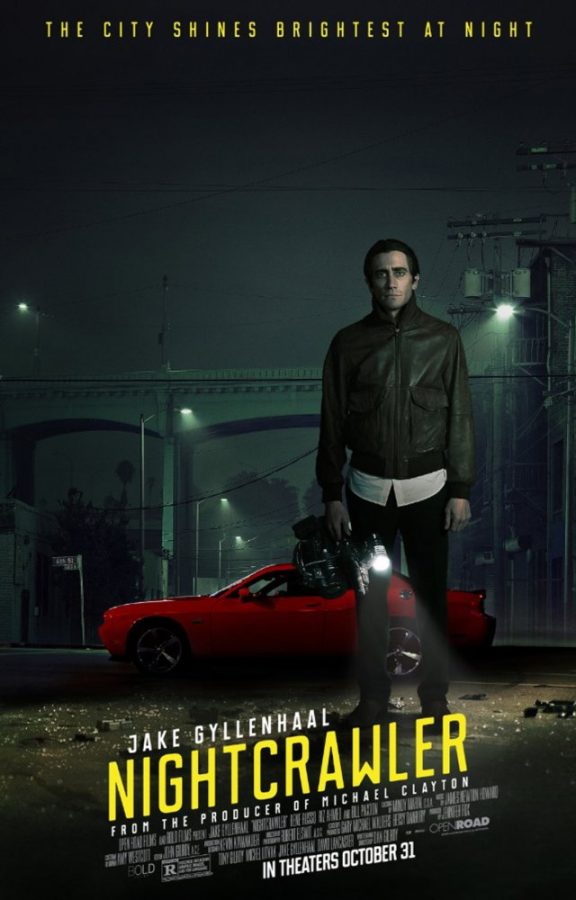As a creeping perversion of the go-getter American mindset told via character study, “Nightcrawler” comes to life with Jake Gyllenhaal’s slinking role as Louis Bloom.
Bloom is a person of the night. He glides along in his car, observing the city lights of Los Angeles illuminate the darkness with his wide eyes. To see him outside in the daylight on a beachside boulevard is an odd sight. It becomes a little less odd once you realize the only reason he’s come out of his sterile apartment is to steal a bicycle to pawn for cash.
He’s a scavenger, robbing construction sites of scrap metal. It’s no coincidence that footage of coyotes somehow finds its way onto video screens in the film.
In the first scene, director Dan Gilroy establishes something repressed and violent lurks beneath Bloom’s unbalanced, calm surface when Bloom attacks a guard that confronts him about his thieving.
Scavengers feast upon carrion, and, one night, Bloom drives upon a scene that resonates with his soul. The bloody aftermath of a car accident is filmed by an amateur video crew that sells the footage to the highest bidding TV news station. In the ratings arm race, if it bleeds, it leads.
Bloom firmly believes in the power of work ethic, so he sets out to accomplish his goal as the film depicts the microcosm of a small business upstart. Bloom wrangles up some basic equipment, a camera and a police scanner, but quickly realizes he needs a second pair of hands.
He then expands his operations and hires Rick (Riz Ahmed) as an assistant. In a scene all too familiar to the current job market, Bloom tries to offer the position as an unpaid internship, but Rick pleads that there be payment.
Bloom is able to get in with Nina (Rene Russo), the news director of a struggling news station, and the two start a working relationship that flirts with the boundaries of something more.
Well, “flirts” isn’t the right word, exactly. At a harmless dinner meeting that takes a turn toward the sinister and manipulative, Bloom forcefully states that unless the two start having sex in their relationship, he’s taking his footage to another news station.
Herein lies the disturbing juxtaposition of “Nightcrawler.” In a way, it’s the classic rags-to-riches story of the American dream: Someone starts out at the bottom, and through a combination of wily business sense, tireless effort and good, old-fashioned hard work, ends up at the top, reaping the rewards.
However, when the dream is to capture a crime scene the quickest or get the closest shot of a mutilated body, something unsettling permeates throughout. This becomes especially true when “getting ahead” involves moving corpses to establish a better frame for filming, or breaking into someone’s house to get the perfect shot.
The score might be the main conveyor of these conflicting elements. One would expect something typical for this thriller, such as long, needling strings or the ominous tinkle of a piano. However, these musical motifs give way to the twang of an electric guitar, distinctively triumphant and soaring, and characteristically Americana. Even though his goals might be twisted, Bloom nevertheless sets — and completes — them.
Quite remarkably, Gyllenhaal’s Bloom is funny, another element of the unhealthy fusion of bright-eyed enthusiasm and distorted intentions. He spouts off jargon about business and the job market as if he’s a college professor, who is just one inane-student-question away from going postal.
Gyllenhaal will surely garner nominations for best actor when the time comes, as he should. In the spirit of “Nightcrawler,” Bloom creeps under your skin, and Gyllenhaal represents it perfectly.
Grade: A-
_______________
Follow Alex Guyton on Twitter.









